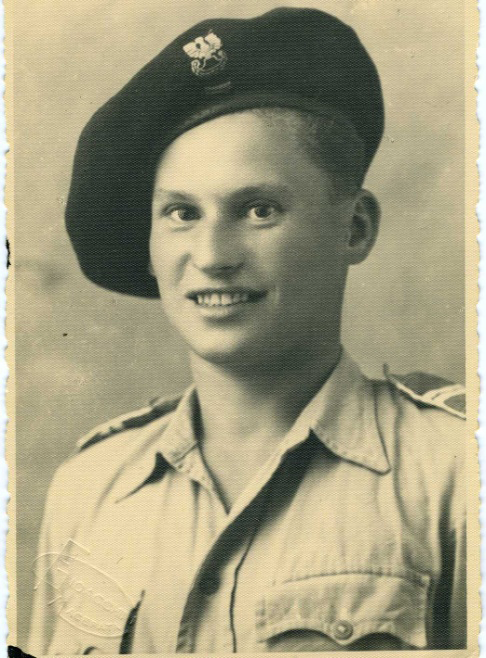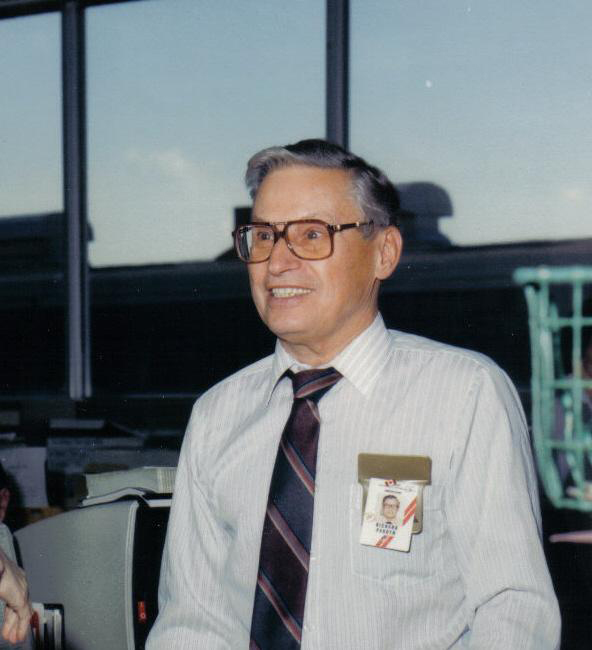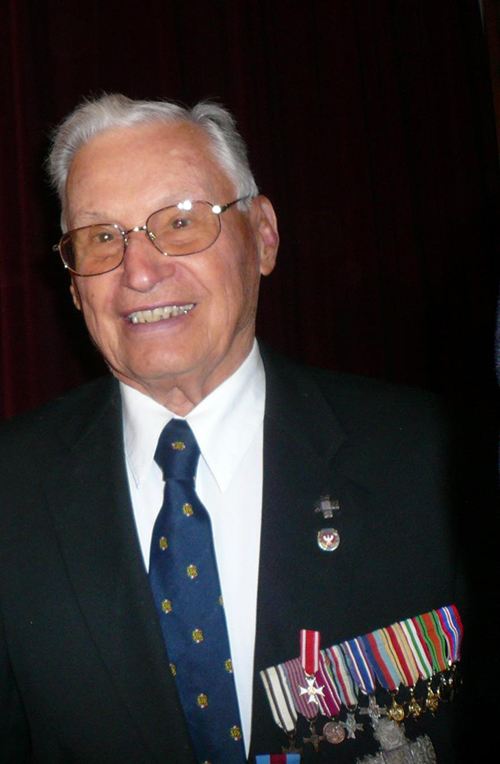Wall of Service
Column
11
Row
15
Ryszard (Richard) Zdzisław Stefan Paudyn 1921-2008
Richard was born in Warsaw on November 27th 1921. He was baptized in St. Andrew Catholic Church in Warsaw. His parents were Wanda (nee Blichewicz) and Stefan Paudyn. The Blichewicz family lived in Łowicz and the Paudyn family was from Radom in Poland. He was the second son in the Paudyn family. In 1920 his brother Jerzy (Jurek) was born and in 1923, his sister Barbara. The family lived in Radość near Warsaw for about 6 years. The Paudyn marriage fell apart and later they divorced. Wanda met her second husband Waclaw Wożniak and took Barbara with her. In 1931 Bożena was born. Stefan Paudyn took care of the boys, Jurek and Ryszard, and he accepted the job as the Agricultural Bank Manager in Lwów Poland. He married Mrs. Jadwiga Blumensztajn later known as “auntie Wisia”. Stefan, Wisia, Jurek, Richard and Stefan’s mother Bronia lived a relatively good life in a nice apartment and employed a full time housekeeper. Richard attended St. Magdalena High School. Lwów during this time was a Polish multicultural city with the well known King Jan Kazimir University and Technical University. Many famous poets, writers and artists lived there. About 1938-39 the Russians started to stir anti-Polish sentiments and young students organized demonstrations to protest some brutal incidents, Richard and Jurek among them. Richard was sentenced to prison but because he was very young he was quickly released.
When WWII started on September 1-st 1939 Richard was determined to join the Polish Army in Romania. He and his friends hired a Ukrainian guide to get across the border. Being very naïve, they were betrayed. Richard was not even 18. He was taken to prison in Drohobycz and sentenced by the Russian KGB to 10 years of labour camp in Siberia just for being a Pole. When on September 17th 1939 the Soviet Union invaded Poland, the country had to fight two enemies; one from the East and one from the West. Richard was transported by train, normally used for transporting animals, to Uchta Siberia (Trockoje region). He was very sick. He lived and worked in a labour camp – gulag. Many men, women and children died there. The conditions were very harsh. For a cigarette, some men could steal and even betray another prisoner. In the meantime the Russian Army switched sides to fight alongside France and England and needed more soldiers to fight Hitler. The Sikorski-Majski pact was signed between the premiers of the Polish Government in exile and the Soviet Union government to release all Poles from the gulags and to form the Polish Army on Soviet Union Territory. After the amnesty reached them, the new soldiers marched for many days to a meeting camp, hungry, tired and distressed. They survived because some merciful Russian women gave them hot water and something to eat for some menial labour. The Polish Army was formed by General Władysław Anders. It is hard to imagine this untrained army of many thousands. They got some clothing and food from Britain, but the Russians had no means by which to feed and arm them. Gen. Anders persuaded the Russians to let them go to Iraq and to join the British Army. A few ships were provided. Many sick men, women and children died at the Caspian Sea. Richard was still young and sick, but survived. The army stationed in Iraq, Iran and Palestine. They became the Second Polish Corps in the Eighth British Army. Richard and his colleagues from Eastern Polish Provinces formed the Sixth Armoured Regiment of the “Children of Lwów”. Later they were transferred to Palestine and to Egypt. The Polish Army was ready to go to the battle. Officially Richard’s regiment was fighting Germans at Piedimonte San Germano- 6 km. from Monte Cassino, but Richard was delegated to be a liaison between his regiment and Monte Cassino. He was there when the battle ended and Polish flag was raised at the Benedictine monastery on May 18th 1944. He still remembered many horrific images after the battle. His comrades are buried at famous Monte Cassino cemetery and at other cemeteries in Italy. After this battle his regiment had many victories along the Via Adriatica. They fought at Bologna, Ancona and Loreto. Richard was always a gentleman and showed respect to the German prisoners of war. His regiment stayed in Italian homes and he met some nice ladies among them the principessa Fernanda, who delivered to him about 40 German prisoners. In 1945 Richard was sent to the Galatone in the south of Italy to train new soldiers, who managed to escape from Poland after the Warsaw Uprising in 1944. After the war his regiment was shipped to England on the ship HMS “Mauritania”. In post war England there was shortage of everything and the military regiments were formally dissolved. As a civilian Richard worked in a hotel as a silver man and later was offered a scholarship to study textile production in Manchester. Some of his colleagues stayed in England and some emigrated to Argentina, Brazil, USA and Canada. Some returned to Poland, where they were either put in prison or sentenced to death for possible collaboration with “The West”.
Richard choose to emigrate to Canada in 1948. He came to Canada at Pier21 on the ship “Aquitania”. His friend John Chmielinski worked for a farmer in Holland Marsh. John persuaded the farmer to sponsor Richard and in his immigration papers a profession “farmer” is written. In Canada he took odd jobs, one of them was to build electrical tracts at the Northern Ontario for Ontario Hydro. In the crew he was the one foreigner and the rest were Cree Indians. The job at Ontario Hydro was very dangerous and after a year Richard returned to Toronto. He worked later at General Electric, Union Carbide and later for 26 years at de Havilland, Mc Donnell Douglas (later Boeing Canada). He took many evening courses to get better paying jobs. He enjoyed a few months in Labour College at the University of Montreal, where he studied politics, philosophy and labour relations. In 1950 he married a young and beautiful Janine Romer and they raised two children Richard Stephen and Barbara Lynn. Unfortunately Richard and Janina divorced in 1983 and Richard married Anna Brzezińska, who came from Poland on UNESCO scholarship. They were introduced by George Gomółka, who worked with Anna at the University of Toronto.
Richard was very active in the Polish community in Canada. For many years he was the manager of the “White Eagle” Soccer Club in Toronto, reaching the provincial championships. He was the president of the North American branch of “Former Soldiers of 6th Armoured Regiment of Children’s of Lwów”. Together with the British Branch they funded a monument at Piedimonte San Germano in Italy. He and his comrade Alex Majewski from the USA sponsored a book about his regiment “Semper Fidelis” written by a historian Waldemar Handke. He was a member of the Board and Vice president of Polish Combatants Association Branch 20 and for 6 years, Vice President of media relations for Canadian Polish Congress Head Executive Board. He worked also for Charitable Foundation of Canadian Polish Congress, Jasna Góra Charitable Foundation and since 2007 for the Adam Mickiewicz Charitable Foundation. With gains on the stock market he created Richard and Anna Paudyn National Memorial Fund dedicated to lectures of Polish history, books and events commemorating Polish soldiers. The recent event was the lecture of Prof. M.B.Biskupski from Connecticut State University “Hollywood’s Portrayal of Poland” on March 24, 2011 at University of Toronto.
For his war achievements he was awarded many medals like Africa Star, British Star, Italy Star, Monte Cassino Cross, War Medal, Polonia Restituta and others. (Now at Yarker Ontario). For his stay in Siberia he got a “Siberian Cross” as a reward for many years suffering in the gulag. For the activities for Polish Community in Canada he got the Knight’s Cross of the Order of Polonia from Poland, Gold Award of the Canadian Polish Congress, Special Award of The Reymont Foundation in Canada, Ontario Award for 50 years of Community Service, City of Toronto Medal and many others. He is also an honorary citizen of Oldrzychowice Kłodzkie in Poland. Richard always wanted to be a journalist and for many years he contributed to the Canadian Auto Workers newspaper, Polish language newspapers in Canada “Gazeta”, “Goniec”, “Zwiazkowiec”, “Głos Polski”, “Dziennik”, “Kwartalnik SPK”. After a meeting with a screenwriter in Poland he got interested in a history of “Wojtek” a small Syrian bear who was bought by Polish soldiers in Iraq, grew with them and was fighting with them at Monte Cassino. The bear died later in the Edinburg ZOO in Scotland after 22 years. Efforts are being made in Scotland now to build a monument and recently a movie about the bear was shown in London, England and in Poland. Richard wrote several articles about this brave bear. They reached the internet and were translated into English and Italian.
In 1990 Richard’s son Rick built him a cottage on his property at Yarker, Ontario. We spent many weekends and summers there cleaning the area, swimming in the Nappanee river, walking, and reading in the sun. Richard was very happy there. His grandchildren called it “Dziadzio’s cottage”. He enjoyed very much to be with them and reminded them of their Polish roots by bringing coils of Polish sausage and bread. He also loved the dogs and horses and I believe they loved him in return. We traveled to many interesting places, including the Caribbean, Alaska and Hawaii. Every 2-3 years we went Poland to visit our families. Richard went sometimes to represent Polish community or Canada at different conventions and sometimes he worked with CIDA. While in Toronto we enjoyed concerts and plays and yes... we played bridge with friends.
Richard was lucky and had very few health problems. Thanks to my niece Christine Walach, who works for an excellent cardiologist, a blockage in his arteries was discovered in 1990 and he had to undergo a triple by-pass surgery. He was always in good spirits, never complained about food and loved the people who showed him their kindness. He was very brave. In the morning of March 9th, 2008 he drove to the church. The pick-up truck from the opposite side of Scarlett Road in Toronto hit us with a full force. Richard died in Synnybrook Hospital. The tribute was at Yorke Chapel of Turner and Porter on March 14th, 2008 and the memorial mass was carried at All Saints Catholic Church in Toronto. Our friend father Edward Ewczyński officiated both ceremonies. He is remembered by his son Richard, daughter Barbara, grandchildren Jennifer, Michael, Kryta, Ricky, Paul, Alexandria and Katrina and by many friends. His wish was to be cremated and his ashes are at the Riverside Cemetery in Toronto. Because he loved Poland and Yarker, small portions of his ashes are at his father’s grave in Otwock, Poland (where memorial plaque is placed), in the Baltic Sea at Gdynia, Poland and in Yarker, Ontario.
It is impossible to write about a person with whom you lived and whom you loved for 25 years but I believe we found each other for a reason. He would like his family to be strong and happy. The name Paudyn means something. Some believed it was a Polish version of Italian Paudini, but there is a city at southern France call Pau and “dyne” is the unit of force. I believe he is helping us, at least I feel his help anytime I need it.
Anna Paudyn, December 1, 2011


